

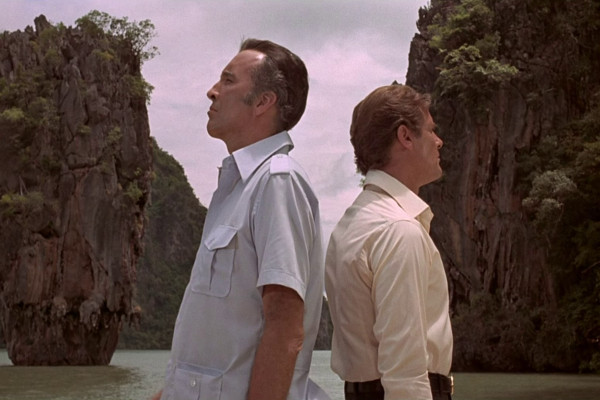
Few James Bond movies are quite as singular in intent as The Man with the Golden Gun. Bond finds out that an unbeatable assassin called Scaramanga (Christopher Lee with a third nipple which really doesn't hold up on BluRay) is out to kill him. So Bond's mission is to track him down, and see if he can kill the man no one can kill. And... that's it, really. Sure, there's a subplot about solar energy, and we find out that Scaramanga wasn't after Bond after all, but these are just distractions from the basic "duel" set-up.
What makes this one work, as with the earlier Diamonds Are Forever, it that it takes so many divergences along the way. It's padding, for sure, but different to padding that's based around the plot. Bond suddenly taking part in a karate tournament or teaming up with Live and Let Die's redneck sheriff J.W. Pepper are things that may gall, but are also the film going in directions that can't be expected. Like that earlier entry, it is offbeat, and contains some odd visual flourishes.
Lulu's much-derided theme song is full of shockingly on-the-nose innuendo, and is actually quite fun, not served well by a title sequence that seems made for a more traditional ballad. Just in case you're unsure that every last area of second meaning hasn't been covered, Bond even learns that Scaramanga likes to have sex before he conducts an assassination, leaving no doubts about exactly how he "comes just before the kill". The end of the film features a different version, with different lyrics.
There is more of a schoolboyish air to the gags, even by Bond standards, with Roger Moore getting every pun out of the word "tit" that he can manage. Maybe Bond turns a corner when he appears in a film buying laxatives so he can poo out an accidentally swallowed bullet, and Bond telling a villain that there's a four-letter word that he's "full of" (used again in The Living Daylights, though with more serious conviction) lowers the character.
There's very few James Bond films that comfortably fit their runtime, the vast majority of them are overlong for their content. The average length of a James Bond movie is just under 2 hours 9 minutes (2 hours 6 minutes for just the Moore entries) and really most of them would benefit from Quantum of Solace's brief 1 hour 46 minutes, given that such a shortened duration contains all the plot the films have, with room to spare. These aren't complex, nuanced works, and the flab isn't given over to extra characterisation, given that the majority of the movies don't specialise in characters that go beyond two dimensions, the lead role included. A fun, but slightly underwhelming film.
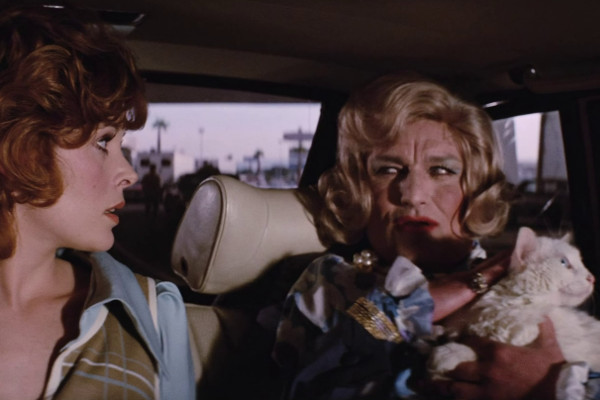
Almost certainly the most off-beat of all the James Bond movies, Diamonds are Forever can be really quite fun if you're in the mood. While technically it can be a little sloppy here and there, it does go off at some diverting tangents. While Bond films can be entertaining, many of them are formulaic, really no different to Bruce Lee's posthumous movie Game of Death, where a series of fights takes place, one after the other.
Diamonds Are Forever sees Bond drive around in a moon buggy (a toy spin-off was made) and battle a cross-dressing Blofeld and his clones. When a fight does happen it's with "Bambi" and "Thumper", two female gymnasts who slap Connery and his new wig around. There's also another of Bond's questionable dalliances with homosexuality in the form of Mr. Wint and Mr. Kidd. A gay villain was given a bit more respect and progressive stance in Skyfall, but that was over 40 years later, and this was just four years after homosexuality had been decriminalised. This is, of course, in regards men - homosexuality in women had never been illegal, and lesbians had been seen in two prior Bond films. Diamonds Are Forever is a film where you could do an entire dissertation on gender politics and the like, a 007 venture with some subtext, no matter how silly or ill-advised.
Diamonds are Forever probably shouldn't be compared with the earlier Connery Bond films as it lacks their, for want of a better word, class. The films in the '70s became a little coarser - this is the first film to show female nipples both in the opening title sequence and in the film itself, and Bond's double entendres begin to become almost singular. Yet while the earlier Bonds are arguably of a higher quality, they're more singular in intent, and perhaps overfamiliar. Diamonds are Forever has multiple twists that make almost no sense whatsoever, their sheer ludicrousness their charm, and, in repeat viewings, their appeal.
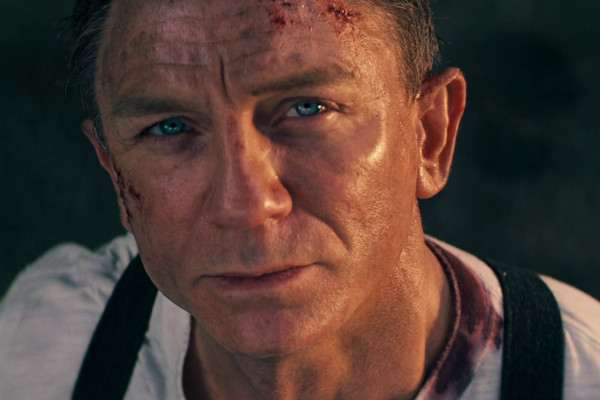
As the only Bond movie on this list seen just once, then it's difficult to truly assess No Time To Die's place in the canon. It's too recent, too fresh, without having had chance to really reflect. The longest Bond film, it contains enough incident to never really feel that long, but there's some bloated and indulgent moments that do detract from its worth.
Ultimately it's a film where the appreciation of it relies heavily on the last ten minutes of screen time, but before that point it's just an okay movie. Maybe it's better than given credit here and deserves a much higher placing, maybe the self-contained Craig era has become so indulgent that it should be ranked lower. Time will tell, it'll get a few rewatches over the years, and, you know what? We've got all the time in the world to see it again.
So, talking about all the sledgehammer nods to On Her Majesty's Secret Service that tie an original direction back into the old series. It makes a kind of sense when you consider that it was due to be released on the 50th anniversary of that movie, but with a two-year delay due to the Coronavirus pandemic, it instead looks like the writers couldn't think up their own emotional payoff. It's taking the thematic content of another movie to form its own narrative, a bit like having The Lion King end with a spliced-in shot of Bambi's mother getting shot. Well... sort of. (Alright, that's the last analogy with a kid's cartoon/TV show in this article.)
What really dismayed about this entry is the transparent selfishness of those behind it. This story of a viral outbreak that could kill millions was put on hold because, in the real world, there was a viral outbreak that could kill millions. Stories that the studio were offered money to stream the film were reported, but new distribution rights holders MGM - boasting a "art for art's sake" logo at the start - held firm, and even reshot some scenes to allow the maximum time to pass so they could reach the optimum money-making window.
While no one should ever be in doubt that the dollar comes first (the irony being that James Bond movies get made with a lot of help from US funding), it would have been a wonderful gesture for the makers of this one to share Bond with a populace stuck indoors in unprecedented circumstances. James Bond had an opportunity to save us all, but instead he went off grid for two years and left us all to our fates.
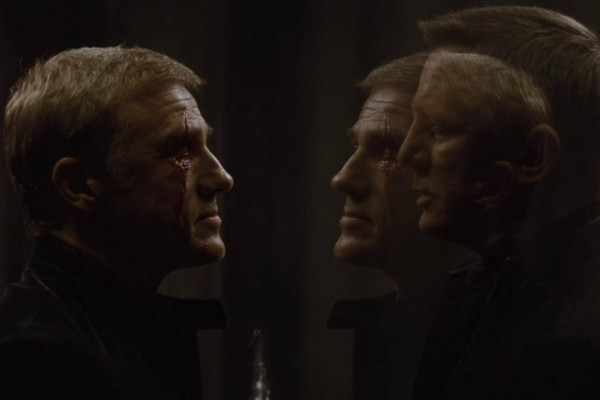
Spectre is the film that finally clears up any ambiguity over the Daniel Craig run, and states outright that, yes, it is a reboot series. His first two entries had the form of "prequels" to the entire run, but it was still left suitably muddied over whether it was the same Bond that had a through line from Connery to at least Dalton. (Bond's wife was last mentioned in Licence To Kill, and, arguably, obliquely referenced in The World Is Not Enough). The time-bending of Judy Dench's version of M being with Bond at the start and Bond's first missions being in the present day were slight confusions, but such matters are more artistic choices rather than concrete details. Yet here we get an origin for Blofeld... a Blofeld who's now the brother of James Bond.
Spectre is, in hindsight, a better film than it may have appeared at the time. The need to tie in the previous Craig movies to Spectre seemed like an indulgence based on the rights to Spectre and Blofeld finally being cleared, but if watched in quick succession after the prior three entries it actually doesn't feel as much of a retcon as it may have initially seemed.
Of course, such matters are also a result of lowered expectations. After his electrifying performance in Tarantino's Inglourious Basterds, there was a real anticipation for Christoph Waltz's take on Blofeld, but he's not given the material or screentime to really excel. Yet this causes the film to reward repeat viewings, where foreknowledge of his lack of involvement is already known, and you're able to appreciate what you do get.
The idea of Blofeld being Bond's (non-biological) brother is, of course, the worst kind of Bond fan fiction, and a real backwards step. It's ironic that, for a film that confirms the Daniel Craig movies operate within their own private universe, it's the one that most emulates a traditional James Bond movie. The plot is largely resolved via an exploding watch, and Blofeld, redefined as an entirely new character, eventually gets his cat and facial scar. It's only a surprise that Blofeld doesn't get his hair burnt off at the end.
Andrew Scott delivers a somewhat stagy performance as a bad guy operative, but then he's given nothing to work with, his dialogue almost descending to Brosnan-era levels of authenticity. It's worth remembering, of course, that while other writers are also credited in the Craig movies (John Logan and Jez Butterworth for this entry) all five of them are also the work of Neal Purvis and Robert Wade, the two men who brought Die Another Day to the world.
This isn't a bad movie. In fact, there are lots of memorable moments in it, particularly the opening rooftop scenes, and some of the dialogue sequences featuring Bond. Daniel Craig essays a compelling take on the character, even if his growing ennui can be glimpsed here and there, and the series has now gone to such levels of unwitting parody that the nipples being exploited in the title sequence belong to him.
But what leaves such a sour taste is that it's the 007 series once again beginning to eat itself. Casino Royale rewrote the franchise as a much more grounded, expansive world, where characters touched three dimensions. Essentially it was an exercise in "what if James Bond existed in the real world?", or an attempt at it. Spectre is the reverse... an attempt to find out what it would be like if Craig's Bond existed in the old Bond universe, complete with daft gadgets and paper-thin motivations. This is not to disparage the original Bond series - it's simply a different thing altogether. To try to mix the two satisfies neither convention, even if it does make ranking them together in articles like these far less of a complicated task.
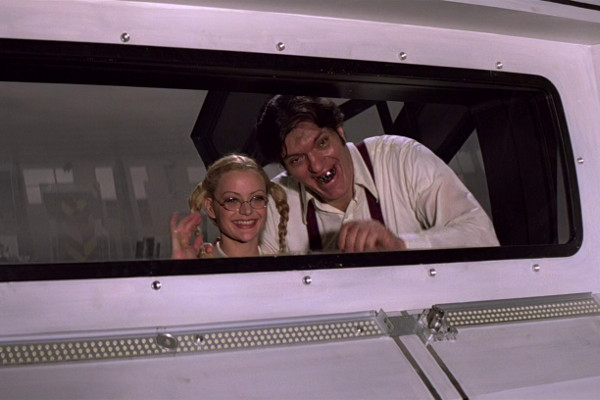
It's hard to rate Moonraker. In many ways it's complete junk, something even Roger Moore said was "far-fetched", and when you've got a pigeon doing a double take to Bond travelling on a motorised gondola, it's perhaps the series reaching its ultimate low.
Sean Connery was always diplomatic about Roger Moore's take on the character, acknowledging that it was a consciously different method of playing Bond, and something that he himself had begun to bring about with Diamonds are Forever. However, while he saw the virtue in Moore's first three films, he didn't share that view of Moonraker. Attending the premiere with Roger, Sean later stated in an interview that "I think he's departed so much from any sort of credence and reality in that way [...] such a dependence on the effects, and there's... no substance."
It's hard to disagree. Yet in terms of box office Moonraker was a commercial hit, the highest-grossing Bond to that date, a record that it would hold until Goldeneye. Of course, such matters don't take into account inflation, but even adjusted, it still only falls below three Connery movies and the success of the Daniel Craig run. Production costs were similarly high: taking inflation into account, then only the Craig movies and three of the Brosnan entries cost more to make. In fact, with inflation factored in, the 34 million needed to bring this adventure to the screen was more cash than Connery's first four films combined. Possibly this is why, while product placement was always notable, it becomes blatant with this entry.
This is the final film to feature Bernard Lee's M, as he died from stomach cancer in 1981. In Moore's autobiography he describes Lee as an extreme drinker, and it is beginning to show here, with M giving orders through a boozer's nose. Even by Bond's crass standards the whole thing has started to get incredibly puerile, with a scientist called Holly Suckwell Goodhead. There's also Jaws from The Spy Who Loved Me adding questionable fun. Perhaps the odd link in the chain is villain Drax. Moore described Christopher Lee's Scaramanga as his only "operatic" villain, and while Michael Lonsdale does a credible acting job, it's not as "big" as the part needs to be, or at least as big as audiences are used to. This said, a billionaire businessman who wants to lead the personal space race is a plot that's proved to be surprisingly prescient.
As the film had already been announced in The Spy Who Loved Me's end credits as For Your Eyes Only, the decision to switch to Moonraker to cash in on the late '70s vogue for space movies is quite shameless. However, it's somewhat wittily noted by having a musical keypad door lock having the theme from Close Encounters of the Third Kind. Perhaps less witty is dressing Roger up as Clint Eastwood and having incidental music that parodies The Magnificent Seven, but then this is a film all about silly excess.
The real selling point about Moonraker is that it moves. As noted in other entries, the pacing for many of the James Bond movies is slightly "off", which isn't due to the perception of the modern day's fast cut fixations. Slow-paced films are fine when they bring out the wonder of the subtext and narrative, but as the James Bond films of this era generally specialise in a megalomaniac with his own shark tank who wants to take over the world, it's not the sort of thing that needs drawing out by Tarkovsky.
The laws of physics aren't even acknowledged, much less obeyed, and it all ends with a laser zap battle. Despite the Mary Whitehouse-inducing "re-entry" scene, it must also be acknowledged that kids loved James Bond, too, with this reputedly being the reason why Jaws turns into a "goodie", along with a collection of Moonraker toys and cars. Probably the stupidest James Bond film, and one that's ranked at least 10 places too high... but it's entertainingly stupid.